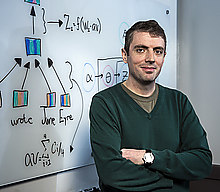 Researchers in the Computational Linguistics and Information Processing (CLIP) Laboratory have received a grant to investigate how people use language in their online interactions to build relationships and trust, as well as to deceive others.
Researchers in the Computational Linguistics and Information Processing (CLIP) Laboratory have received a grant to investigate how people use language in their online interactions to build relationships and trust, as well as to deceive others.
The one-year, $165,000 grant is from the Defense Advanced Research Projects Agency (DARPA). It is part of DARPA’s Active Social Engineering Defense program, designed to limit online psychological manipulations that can trick unsuspecting users or employees into handing over confidential or sensitive data.
Jordan Boyd-Graber (in photo), an associate professor of computer science with an appointment in the University of Maryland Institute for Advanced Computer Studies, is principal investigator of the project. Boyd-Graber, who is the current director of the CLIP lab, also has appointments in the iSchool and the Language Science Center.
Denis Peskov, a third-year computer science doctoral student who is advised by Boyd-Graber, is helping lead the project.
Peskov says the CLIP team will study language used to build trust or offer deception by observing an online version of the classic board game Diplomacy. The game is played by up to seven players, who negotiate and wage war for territorial control by making and breaking alliances with other players.
By running multiple variations of the game, the researchers can study what language effectively deceives a player’s opponents, and what communication leads to successful cooperation.
They’ll use the information to build machine learning algorithms that are able to better predict online deception and betrayal.
The project builds on previous research that Boyd-Graber conducted with a group of researchers from Cornell University.
In that study, researchers examined 249 online games of Diplomacy that included almost 145,000 messages among the players. When the researchers used a computer program to compare exchanges between players whose relationships ended in betrayal with those whose relationships lasted, they discerned subtle signals of impending betrayal, such as excessive politeness.
“Relative to Jordan’s previous work, we wanted to get real-time feedback from the users as to their thoughts on the veracity of their opponents and their allies,” Peskov says.
—Story by Melissa Brachfeld